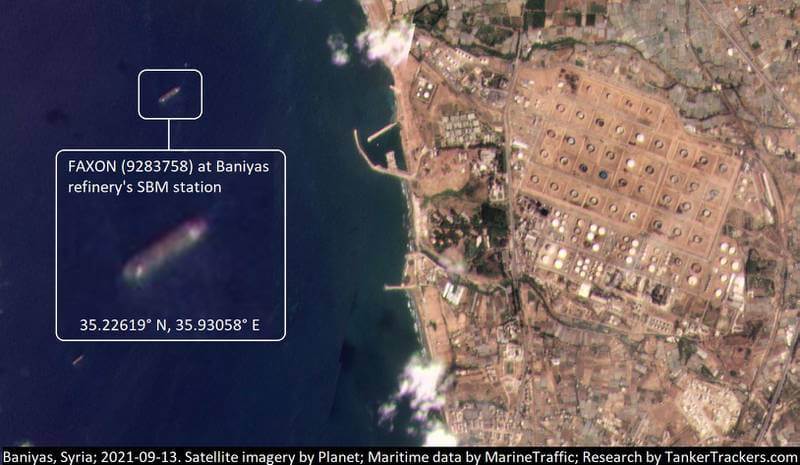Newly released reports found that 17 shipments by eight different tankers have delivered more than 16 million barrels of oil from the Islamic Republic of Iran to Syria over the past six months, docking at Syria's Baniyas Port and violating United States sanctions imposed on both the Islamic Republic petroleum industry and Syrian President Bashar Assad's government.
"This news is not surprising. Syria is a longtime ally of Iran, with a number of cooperation agreements on oil and other sectors. Iran has been delivering oil to Syria before the JCPOA, during the JCPOA, and has continued to do so after the JCPOA," said Claire Jungman, Chief of Staff of United Against Nuclear Iran (UANI).
According to the reports, the Daran, Sam 121, Lotus, Arman 114, Shadi, Veronica, Sirvan Sabou, and Ares tankers sail under the Iran regime’s flag. Daran is the smallest of the eight tankers, carrying around 316,308 barrels. The largest of the eight is the Arman 114 tanker, which can carry over two million barrels of oil.
Ship tracking data and satellite imagery from TankerTracker.com indicate that from November of last year to April of this year, the ships have docked at Baniyas at least 17 times, delivering 16.4 million barrels to Damascus. The ship tracking website revealed that there was a total of 20 departures from the Islamic Republic to Syria, amounting to 17.1 million barrels.
Jungman told The Foreign Desk that the revelations match UANI's ship tracking data, which "estimates 16.7 million barrels have been delivered to Syria during that time frame on 17 occasions." Jungman provided a link to UANI's calculations.
Given the US sanctions against the regime in Tehran, the oil tankers have delivered their petroleum supply covertly, using the Suez Canal in Egypt to the Mediterranean Sea. Once en-route, the tankers turn off their transceivers that broadcast their location to vessel traffic services using the automatic identification system (AIS), which identifies the vessel, its speed, direction, and draft.
"The US government doesn't lack intelligence about Iranian sanctions busting. What it lacks is the will to enforce sanctions in a sustained manner and do what is necessary to deter and counter any subsequent Iranian retaliation," said John Hannah, a Randi and Charles Wax Senior Fellow at the Jewish Institute for National Security of America (JINSA) and former national security advisor to Vice President Dick Cheney.
Hannah noted that on several occasions following a US seizure of illicit Iranian oil shipments—including just within the last month—Iran has responded by "seizing commercial oil tankers transiting near its coast."
"A few years ago, after Israel was suspected of sabotaging Iranian ships on their way to Syria, Iran retaliated with a series of attacks against commercial vessels with a link to Israel," he added.
Once in the Mediterranean, the tankers "go dark," turning off their transceivers for two to three weeks while they sail towards Syria, preventing outsiders from monitoring their location. Despite their covert actions, the tankers can be tracked thanks to satellites, which show Iranian tankers traveling to Baniyas, offloading their oil, and returning to the Suez.
Going through the canal requires the ships to turn on their transceivers, revealing their decreased draft. Upon reentry into the Red Sea, the tankers "go dark" again, returning to Tehran to load more petroleum supply, meeting with other-empty tankers, and undergoing a ship-to-ship transfer of new oil, which they take to Syria through the canal.
For the past several months, the combined value of the oil the Islamic Republic of Iran has shipped to Syria has been estimated to be around $1.25 billion. According to reports, the "ghost tankers" are not well maintained and are old because of US sanctions, resulting in the regime engaging in dangerous ship-to-ship transfers.
"Some of the tankers involved in these transfers are already sanctioned. However, these transfers do not typically touch a US financial nexus to allow for additional action from the US. With that being said, there are a few vessels involved that have not been sanctioned, and we encourage the administration to take action on those vessels," Jungman explained to The Foreign Desk.
Many of these "ghost" tankers sail near Israeli gas fields in the Mediterranean and, according to environmental officials, led to violent incidents and ecological disasters amid the naval war between Jerusalem and Tehran. In February 2021, a significant oil spill occurred from a Libyan vessel that brought oil from the Islamic Republic to Syria as it was sailing across Israel's coast covertly, leaving 160 kilometers of Israel's Mediterranean coastline covered in tar.
Hannah explained that the Islamic Republic has "repeatedly shown that they are prepared to respond to both US and Israeli efforts in the maritime domain to constrain their oil exports."
"If the US really is serious about cutting Iran off, it needs to be prepared to go up the escalation ladder with Iran and, if necessary, engage in a much larger military conflict that would impose an overwhelmingly painful price on any Iranian efforts to retaliate," Hannah told the Foreign Desk.
Despite US warnings, Iran continues to ship illegal oil shipments to the Assad regime, which officials say will be used to aid the Assad regime against Syrian rebels and allow Islamic-backed terrorist groups like Hezbollah in Lebanon and Hamas and Islamic Jihad in Gaza.
"The US should work with the authorities in the Suez Canal to prevent these tankers carrying Iranian oil from getting through. It should also continue to apply pressure on Saudi Arabia, the UAE, and Israel to block the oil from reaching Assad," Jungman said.
Hannah notes that with the Biden administration's priorities on Ukraine and China and concerns about the stability of global energy markets and high oil prices, the White House has been "deeply reluctant to risk any sort of larger military conflict in the Middle East."
"Knowing that a sustained effort to stop all illicit Iranian exports could risk precisely such a conflict, the administration has generally chosen to look the other way," he said.










